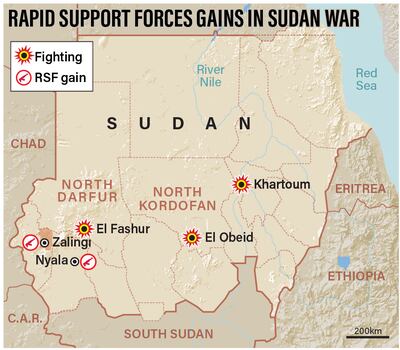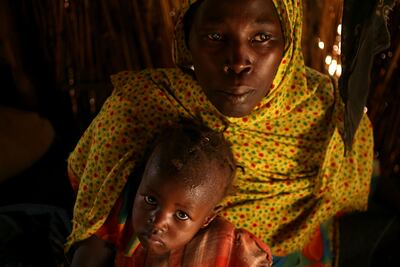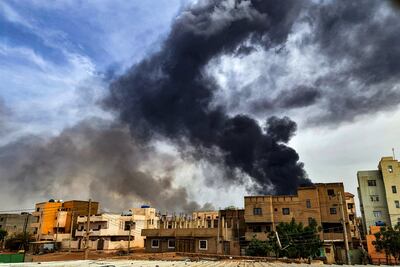Recent victories by Sudan's Rapid Support Forces are likely to strengthen the negotiating position of the paramilitary group that has been fighting the army since April, but do not amount to a game changer in a war that neither side is likely to win, Sudanese analysts told The National.
The RSF on Tuesday announced the capture of Zalingi in Darfur, less than a week after it took Nyala, also in Darfur and Sudan's second-largest city with a population of about four million.
In both cases, the cities fell after the RSF defeated and captured the local army garrisons.
RSF fighters are also believed to be close to defeating the army in El Fasher in Darfur and El Obeid in the neighbouring Kordofan region.
“The question is how far can the Rapid Support Forces sustain its advances and whether the resentment felt by most Sudanese towards it can be overcome,” said military and security analyst Omar Arbab.
“They want to match the large swathes of territory still under army control in the centre, east and north of the country to improve their position in Jeddah,” he said, alluding to the venue of ceasefire negotiations sponsored by Saudi Arabia and the US.
War crimes accusations
The RSF's forerunner is a notorious militia called the Janjaweed that is accused of war crimes in Darfur during the civil war in the 2000s. In the conflict, it fought on the side of the government of now-ousted dictator Omar Al Bashir.
The International Criminal Court is investigating a new set of crimes allegedly committed by the RSF and allied militias in the summer when hundreds from the ethnic African Masalit tribe were killed and thousands forced to flee their homes in Darfur and take refuge in Chad.
In Khartoum, RSF fighters are accused of widespread looting, evicting civilians from their homes, and sexual assault. They are also accused of the unlawful detention of hundreds of civilians.
“The paramilitary enjoys the support of powerful Arab tribes in Darfur, giving it a level of popular acceptance that can help its drive to expand its control there,” according to Osman Al Mirghany, a prominent Sudanese analyst and editor of the Khartoum daily Al Tayar.
However, he explained, the deep opposition felt by heavily armed African tribes towards the RSF could be a major stumbling block for the paramilitary to seize the entire Darfur region, which is the size of France and borders Chad, Libya, South Sudan and the Central African Republic.
An RSF-controlled Darfur would also tempt foreign rebel groups already in the region – mostly from Chad and Central African Republic – to increase their presence, undermining security and stability and posing a challenge to the RSF's authority, according to Mr Al Mirghany.
Deadlock in Khartoum drives RSF shift to Darfur
Neither side has been able to gain an edge over its rival in Khartoum, while RSF fighters control most districts, the army uses heavy artillery and air strikes to pummel the paramilitary's positions.
“The shift to Darfur to take territory may in part be attributed to the RSF's failure to break the stalemate in Khartoum, where it has suffered heavy casualties at the hands of the army,” said Mr Al Mirghany.
The army has so far been unable to dislodge RSF fighters from their positions deep in the capital's residential districts.
“The crude firepower used by the army has failed to change the situation on the ground in Khartoum because this tactic is not effective in urban warfare,” said Wael Mohammed El Hassan, another Sudanese analyst. “That, and the loss of several of its Khartoum bases, has cost the army its prestige.”
The war in Sudan broke out over differences between army chief Gen Abdel Fattah Al Burhan and RSF commander Gen Mohamed Dagalo, his one-time ally and deputy in Sudan's ruling military council, over the implementation of a democratic transition plan.
Their dispute escalated into an armed struggle for military and political supremacy that has displaced about six million of Sudan's estimated 48 million population, killed thousands and destroyed much of the infrastructure in the vast and impoverished Afro-Arab nation.
It has also created uncertainty over the democratic transition Sudan embarked upon after Al Bashir's regime was toppled in 2019 after about 30 years in power.
Mediation by Saudi Arabia and the US produced a series of ceasefire agreements that all collapsed. The process was suspended this summer but negotiations resumed last week in Jeddah.
The analysts said the renewed talks were likely to produce a deal within days on a temporary truce that would allow humanitarian aid to reach the millions of Sudanese affected by the war.
The next phase, they said, would deal with resolving the differences between the two sides over the assimilation of the RSF into the armed forces, something that Gen Dagalo has long resisted and Gen Al Burhan insisted on.
There has been no word from the Saudi or US negotiators on the progress of the talks.
The%20US%20Congress%20explained
%3Cp%3E-%20Congress%20is%20one%20of%20three%20branches%20of%20the%20US%20government%2C%20and%20the%20one%20that%20creates%20the%20nation's%20federal%20laws%3C%2Fp%3E%0A%3Cp%3E-%20Congress%20is%20divided%20into%20two%20chambers%3A%20The%20House%20of%20Representatives%20and%20the%20Senate%3C%2Fp%3E%0A%3Cp%3E-%C2%A0The%20House%20is%20made%20up%20of%20435%20members%20based%20on%20a%20state's%20population.%20House%20members%20are%20up%20for%20election%20every%20two%20years%3C%2Fp%3E%0A%3Cp%3E-%20A%20bill%20must%20be%20approved%20by%20both%20the%20House%20and%20Senate%20before%20it%20goes%20to%20the%20president's%20desk%20for%20signature%3C%2Fp%3E%0A%3Cp%3E-%20A%20political%20party%20needs%20218%20seats%20to%20be%20in%20control%20of%20the%20House%20of%20Representatives%3C%2Fp%3E%0A%3Cp%3E-%20The%20Senate%20is%20comprised%20of%20100%20members%2C%20with%20each%20state%20receiving%20two%20senators.%20Senate%20members%20serve%20six-year%20terms%3C%2Fp%3E%0A%3Cp%3E-%20A%20political%20party%20needs%2051%20seats%20to%20control%20the%20Senate.%20In%20the%20case%20of%20a%2050-50%20tie%2C%20the%20party%20of%20the%20president%20controls%20the%20Senate%3C%2Fp%3E%0A
The Pope's itinerary
Sunday, February 3, 2019 - Rome to Abu Dhabi
1pm: departure by plane from Rome / Fiumicino to Abu Dhabi
10pm: arrival at Abu Dhabi Presidential Airport
Monday, February 4
12pm: welcome ceremony at the main entrance of the Presidential Palace
12.20pm: visit Abu Dhabi Crown Prince at Presidential Palace
5pm: private meeting with Muslim Council of Elders at Sheikh Zayed Grand Mosque
6.10pm: Inter-religious in the Founder's Memorial
Tuesday, February 5 - Abu Dhabi to Rome
9.15am: private visit to undisclosed cathedral
10.30am: public mass at Zayed Sports City – with a homily by Pope Francis
12.40pm: farewell at Abu Dhabi Presidential Airport
1pm: departure by plane to Rome
5pm: arrival at the Rome / Ciampino International Airport
Women%E2%80%99s%20T20%20World%20Cup%20Qualifier
%3Cp%3E%3Cstrong%3EUAE%20fixtures%3C%2Fstrong%3E%3C%2Fp%3E%0A%3Cp%3E25%20April%20%E2%80%93%20Ireland%20v%20UAE*%3Cbr%3E27%20April%20%E2%80%93%20UAE%20v%20Zimbabwe**%3Cbr%3E29%20April%20%E2%80%93%20Netherlands%20v%20UAE*%3Cbr%3E3%20May%20%E2%80%93%20UAE%20v%20Vanuatu*%3Cbr%3E5%20May%20%E2%80%93%20Semi-finals%3Cbr%3E7%20May%20%E2%80%93%20Final%3Cbr%3E%3Cstrong%3EUAE%20squad%3A%20%3C%2Fstrong%3EEsha%20Oza%20(captain)%2C%20Al%20Maseera%20Jahangir%2C%20Avanee%20Patel%2C%20Heena%20Hotchandani%2C%20Indhuja%20Nandakumar%2C%20Kavisha%20Kumari%2C%20Khushi%20Sharma%2C%20Lavanya%20Keny%2C%20Mehak%20Thakur%2C%20Rinitha%20Rajith%2C%20Samaira%20Dharnidharka%2C%20Siya%20Gokhale%2C%20Suraksha%20Kotte%2C%20Theertha%20Satish%2C%20Vaishnave%20Mahesh.%3C%2Fp%3E%0A%3Cp%3E*Zayed%20Cricket%20Stadium%3C%2Fp%3E%0A%3Cp%3E**Tolerance%20Oval%3C%2Fp%3E%0A
Company%20profile
%3Cp%3E%3Cstrong%3EName%3A%20%3C%2Fstrong%3EPurpl%3C%2Fp%3E%0A%3Cp%3E%3Cstrong%3ECo-founders%3A%20%3C%2Fstrong%3EKarl%20Naim%2C%20Wissam%20Ghorra%2C%20Jean-Marie%20Khoueir%3C%2Fp%3E%0A%3Cp%3E%3Cstrong%3EBased%3A%20%3C%2Fstrong%3EHub71%20in%20Abu%20Dhabi%20and%20Beirut%3C%2Fp%3E%0A%3Cp%3E%3Cstrong%3EStarted%3A%20%3C%2Fstrong%3E2021%3C%2Fp%3E%0A%3Cp%3E%3Cstrong%3ENumber%20of%20employees%3A%20%3C%2Fstrong%3E12%3C%2Fp%3E%0A%3Cp%3E%3Cstrong%3ESector%3A%20%3C%2Fstrong%3EFinTech%3C%2Fp%3E%0A%3Cp%3E%3Cstrong%3EFunding%3A%20%3C%2Fstrong%3E%242%20million%26nbsp%3B%3C%2Fp%3E%0A
WandaVision
Starring: Elizabeth Olsen, Paul Bettany
Directed by: Matt Shakman
Rating: Four stars
The%20trailblazers
%3Cp%3ESixteen%20boys%20and%2015%20girls%20have%20gone%20on%20from%20Go-Pro%20Academy%20in%20Dubai%20to%20either%20professional%20contracts%20abroad%20or%20scholarships%20in%20the%20United%20States.%20Here%20are%20two%20of%20the%20most%20prominent.%0D%3C%2Fp%3E%0A%3Cp%3E%3Cstrong%3EGeorgia%20Gibson%20(Newcastle%20United)%3C%2Fstrong%3E%0D%3Cbr%3EThe%20reason%20the%20academy%20in%20Dubai%20first%20set%20up%20a%20girls%E2%80%99%20programme%20was%20to%20help%20Gibson%20reach%20her%20potential.%20Now%20she%20plays%20professionally%20for%20Newcastle%20United%20in%20the%20UK.%0D%3C%2Fp%3E%0A%3Cp%3E%3Cstrong%3EMackenzie%20Hunt%20(Everton)%3C%2Fstrong%3E%0D%3Cbr%3EAttended%20DESS%20in%20Dubai%2C%20before%20heading%20to%20the%20UK%20to%20join%20Everton%20full%20time%20as%20a%20teenager.%20He%20was%20on%20the%20bench%20for%20the%20first%20team%20as%20recently%20as%20their%20fixture%20against%20Brighton%20on%20February%2024.%0D%3C%2Fp%3E%0A
Abu Dhabi card
5pm: Handicap (TB) Dh100,000 2,400m
5.30pm: Wathba Stallions Cup Handicap (PA) Dh 70,000 2,200m
6pm: Abu Dhabi Fillies Classic Prestige (PA) Dh110,000 1,400m
6.30pm: Abu Dhabi Colts Classic Prestige (PA) Dh110,000 1,400m
7pm: Handicap (PA) Dh85,000 1,600m
7.30pm: Maiden (PA) Dh80,000 1,600m
The National selections:
5pm: Valcartier
5.30pm: AF Taraha
6pm: Dhafra
6.30pm: Maqam
7pm: AF Mekhbat
7.30pm: Ezz Al Rawasi
Desert Warrior
Starring: Anthony Mackie, Aiysha Hart, Ben Kingsley
Director: Rupert Wyatt
Rating: 3/5
Benefits of first-time home buyers' scheme
- Priority access to new homes from participating developers
- Discounts on sales price of off-plan units
- Flexible payment plans from developers
- Mortgages with better interest rates, faster approval times and reduced fees
- DLD registration fee can be paid through banks or credit cards at zero interest rates
Elvis
%3Cp%3E%3Cstrong%3EDirector%3A%3C%2Fstrong%3E%20Baz%20Luhrmann%3C%2Fp%3E%0A%3Cp%3E%3Cstrong%3EStars%3A%3C%2Fstrong%3E%20Austin%20Butler%2C%20Tom%20Hanks%2C%20Olivia%20DeJonge%3C%2Fp%3E%0A%3Cp%3E%3Cstrong%3ERating%3A%3C%2Fstrong%3E%204%2F5%3C%2Fp%3E%0A
First Person
Richard Flanagan
Chatto & Windus
The Greatest Royal Rumble card as it stands
The Greatest Royal Rumble card as it stands
50-man Royal Rumble - names entered so far include Braun Strowman, Daniel Bryan, Kurt Angle, Big Show, Kane, Chris Jericho, The New Day and Elias
Universal Championship Brock Lesnar (champion) v Roman Reigns in a steel cage match
WWE World Heavyweight ChampionshipAJ Styles (champion) v Shinsuke Nakamura
Intercontinental Championship Seth Rollins (champion) v The Miz v Finn Balor v Samoa Joe
United States Championship Jeff Hardy (champion) v Jinder Mahal
SmackDown Tag Team Championship The Bludgeon Brothers (champions) v The Usos
Raw Tag Team Championship (currently vacant) Cesaro and Sheamus v Matt Hardy and Bray Wyatt
Casket match The Undertaker v Chris Jericho
Singles match John Cena v Triple H
Cruiserweight Championship Cedric Alexander v tba
Arabian Gulf Cup FINAL
Al Nasr 2
(Negredo 1, Tozo 50)
Shabab Al Ahli 1
(Jaber 13)
Liverpool’s fixtures until end of 2019
Saturday, November 30, Brighton (h)
Wednesday, December 4, Everton (h)
Saturday, December 7, Bournemouth (a)
Tuesday, December 10, Salzburg (a) CL
Saturday, December 14, Watford (h)
Tuesday, December 17, Aston Villa (a) League Cup
Wednesday, December 18, Club World Cup in Qatar
Saturday, December 21, Club World Cup in Qatar
Thursday, December 26, Leicester (a)
Sunday, December 29, Wolves (h)
Ten tax points to be aware of in 2026
1. Domestic VAT refund amendments: request your refund within five years
If a business does not apply for the refund on time, they lose their credit.
2. E-invoicing in the UAE
Businesses should continue preparing for the implementation of e-invoicing in the UAE, with 2026 a preparation and transition period ahead of phased mandatory adoption.
3. More tax audits
Tax authorities are increasingly using data already available across multiple filings to identify audit risks.
4. More beneficial VAT and excise tax penalty regime
Tax disputes are expected to become more frequent and more structured, with clearer administrative objection and appeal processes. The UAE has adopted a new penalty regime for VAT and excise disputes, which now mirrors the penalty regime for corporate tax.
5. Greater emphasis on statutory audit
There is a greater need for the accuracy of financial statements. The International Financial Reporting Standards standards need to be strictly adhered to and, as a result, the quality of the audits will need to increase.
6. Further transfer pricing enforcement
Transfer pricing enforcement, which refers to the practice of establishing prices for internal transactions between related entities, is expected to broaden in scope. The UAE will shortly open the possibility to negotiate advance pricing agreements, or essentially rulings for transfer pricing purposes.
7. Limited time periods for audits
Recent amendments also introduce a default five-year limitation period for tax audits and assessments, subject to specific statutory exceptions. While the standard audit and assessment period is five years, this may be extended to up to 15 years in cases involving fraud or tax evasion.
8. Pillar 2 implementation
Many multinational groups will begin to feel the practical effect of the Domestic Minimum Top-Up Tax (DMTT), the UAE's implementation of the OECD’s global minimum tax under Pillar 2. While the rules apply for financial years starting on or after January 1, 2025, it is 2026 that marks the transition to an operational phase.
9. Reduced compliance obligations for imported goods and services
Businesses that apply the reverse-charge mechanism for VAT purposes in the UAE may benefit from reduced compliance obligations.
10. Substance and CbC reporting focus
Tax authorities are expected to continue strengthening the enforcement of economic substance and Country-by-Country (CbC) reporting frameworks. In the UAE, these regimes are increasingly being used as risk-assessment tools, providing tax authorities with a comprehensive view of multinational groups’ global footprints and enabling them to assess whether profits are aligned with real economic activity.
Contributed by Thomas Vanhee and Hend Rashwan, Aurifer
'Worse than a prison sentence'
Marie Byrne, a counsellor who volunteers at the UAE government's mental health crisis helpline, said the ordeal the crew had been through would take time to overcome.
“It was worse than a prison sentence, where at least someone can deal with a set amount of time incarcerated," she said.
“They were living in perpetual mystery as to how their futures would pan out, and what that would be.
“Because of coronavirus, the world is very different now to the one they left, that will also have an impact.
“It will not fully register until they are on dry land. Some have not seen their young children grow up while others will have to rebuild relationships.
“It will be a challenge mentally, and to find other work to support their families as they have been out of circulation for so long. Hopefully they will get the care they need when they get home.”
SPECS
%3Cp%3E%3Cstrong%3EEngine%3A%20%3C%2Fstrong%3E2-litre%204-cylinder%20petrol%20(V%20Class)%3B%20electric%20motor%20with%2060kW%20or%2090kW%20powerpack%20(EQV)%0D%3Cbr%3E%3Cstrong%3EPower%3A%3C%2Fstrong%3E%20233hp%20(V%20Class%2C%20best%20option)%3B%20204hp%20(EQV%2C%20best%20option)%0D%3Cbr%3E%3Cstrong%3ETorque%3A%3C%2Fstrong%3E%20350Nm%20(V%20Class%2C%20best%20option)%3B%20TBA%20(EQV)%0D%3Cbr%3E%3Cstrong%3EOn%20sale%3A%20%3C%2Fstrong%3EMid-2024%0D%3Cbr%3E%3Cstrong%3EPrice%3A%20%3C%2Fstrong%3ETBA%0D%3C%2Fp%3E%0A
The stats
Ship name: MSC Bellissima
Ship class: Meraviglia Class
Delivery date: February 27, 2019
Gross tonnage: 171,598 GT
Passenger capacity: 5,686
Crew members: 1,536
Number of cabins: 2,217
Length: 315.3 metres
Maximum speed: 22.7 knots (42kph)
Take Me Apart
Kelela
(Warp)





